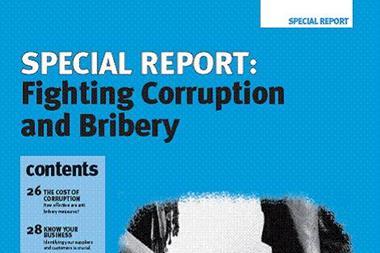The supply chain has become an important area of focus for corporate integrity but it’s not easy to ensure that your suppliers live up to your ethical standards says Nathan Skinner
The supply chain has become an important area of focus for corporate integrity. The problem is that companies sell their products in developed markets, but they source them from suppliers in developing countries. Companies are required to live up to certain standards if they want to compete in crowded Western markets and they appreciate that their brand can be significantly damaged if a supplier fails to live up to societal expectations. Nevertheless, drilling these principles into a company’s supply chain is extremely hard.
Companies draw up codes of practice and audit their suppliers to make sure they are complying with them. Manufacturers in developing countries are likely to be contractually obliged to comply with their clients’ codes of practice. Suppliers sometimes have their contracts terminated for failing to live up to these principles. Last year McDonalds stopped sourcing tea from Tetley because it was not certified by an environmental group, and Starbucks terminated contracts with 14 suppliers after an audit revealed they failed to meet its ethical standards. But no matter how good the audits are, they do not remove the risk altogether. The media and regulators continue to expose a stream of unethical business practices within the supply chains of major customer-facing companies.
At the beginning of this year an undercover TV journalist discovered that Primark and Peacocks, two large British retailers, were selling textiles sourced from an illegal sweatshop in the north-west of England. Both retailers made bold PR claims about their code of ethics, but the investigation revealed that the Manchester supplier was employing illegal workers and paying them less than the minimum wage. It was also reported that auditors had inspected the supplier three times in a year, yet had failed to uncover the illegal practices. This kind of exposure reveals a big disconnect between what companies say they are doing and what is happening on the ground. Consumers are naturally sceptical about big corporations and they will assume the worst. Corporate responsibility programmes can help build trust but when they are oversold, and particularly when they are proved wrong, it is hard to regain consumer confidence.
‘Organisations need to be balanced and transparent in what they report about corporate social responsibility,’ says Doug Johnston, a CSR expert with Ernst & Young. ‘The really transparent organisations will show where the bad areas are and what they are doing to deal with poor performance,’ he says. Most organisations would accept that driving CSR into the supply chain is a work in progress. ‘It is never possible to provide 100% confirmation that all suppliers are fully observing our code of practice at all times,’ comments Gemma Lacey, project manager CSR, John Lewis Partnership.
Another issue that causes anxiety in the supply chain is bribery. Several high profile reports in the media have scolded companies for their inability to prevent employees from behaving corruptly when doing business overseas. Siemens was embroiled in a widespread corruption and bribery scandal for most of 2008. As the bribery case continued to evolve, the company came under fire for not doing enough to implement its own anti-corruption measures. The year ended with Siemens being fined £1.2bn for corruption. According to the prosecutors, Siemens knowingly circumvented internal controls and paid around 600m euros in bribes. Despite the fact that regulators are cracking down on it, bribery is unlikely to go away quickly. It is an accepted way of doing business in many parts of the world, and companies may also be concerned that by cracking down on it they could lose out to competitors who are less stringent.
Environmental performance has become perhaps the biggest sales weapon in any company’s CSR arsenal. Painting oneself to be environmentally friendly can enhance a company’s reputation and boost its share price. It is not just an issue of reputation: there are significant economic benefits associated with cutting energy use and waste. Increasingly, companies have to report on their environmental performance and prove to investors that they are doing what they say. Several big ethical investment funds have sprung up as investors realise that strong environmental performance is not only a sign of good management but it could also help companies prepare for environmental liabilities in the near future. Businesses will be affected by laws, made in the name of climate change, long before they are affected by climate change itself. Environmental legislation is a trend that is only set to intensify, although strict enforcement of corporate environmental responsibilities is unlikely during the current economic turmoil. Environmental performance also has impacts on a company’s ability to recruit and retain employees, as people become much more interested in the values of the businesses they work for.
Most efforts to green the supply chain consist of offsetting the carbon emitted in manufacturing and transporting products. Unfortunately the complexity of supply chains makes measuring emissions very difficult. How can a company track and compare the environmental impact of the delivery and consumption of every product it produces? And globalisation means companies continue to source products from China, because it is cheaper, rather than closer to home, thereby increasing the environmental cost of transporting goods.
Corporate integrity involves walking the walk and not just talking it. Sooner or later a company will be found out if its reports and filings communicate one thing when in reality it is doing something else. We do not need to look any further than the agents of the current crisis to see what happens to companies that become obsessed with greed and short-termism.
Postscript
Nathan Skinner is associate editor, StrategicRISK



















No comments yet